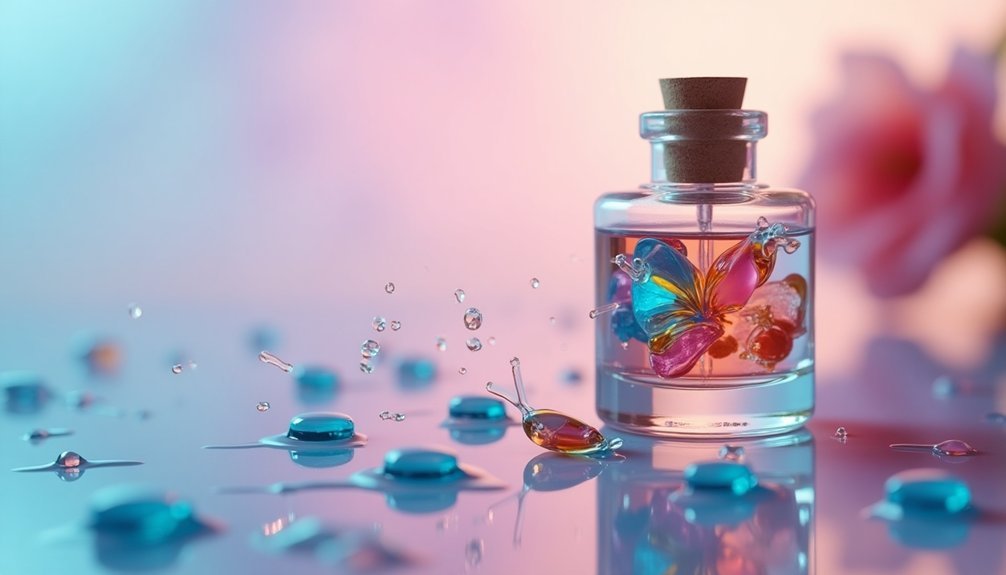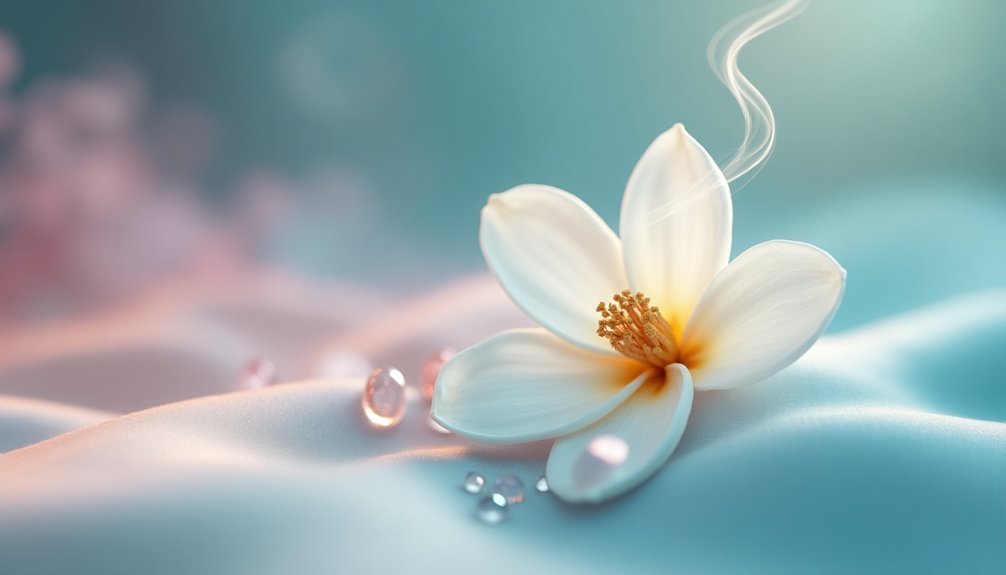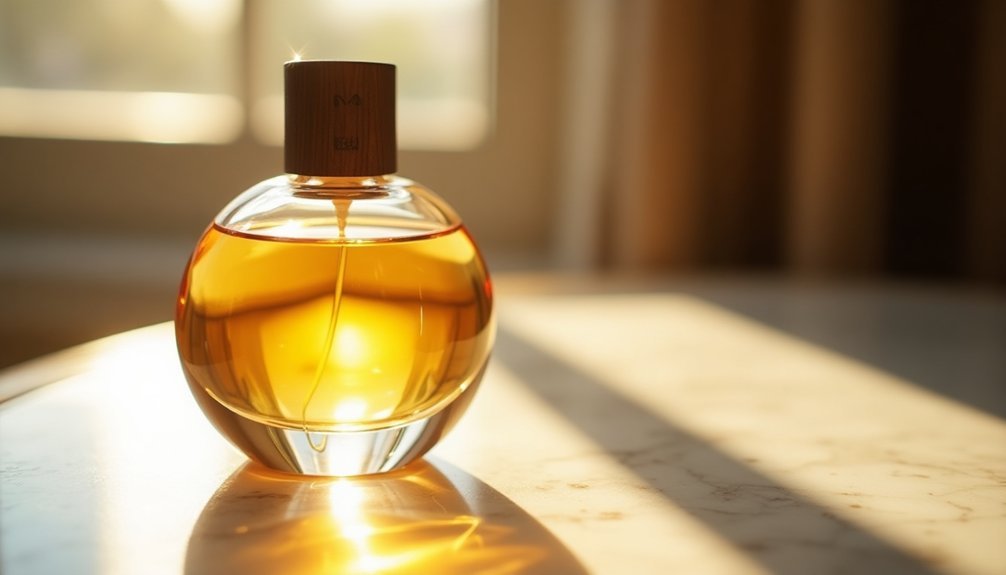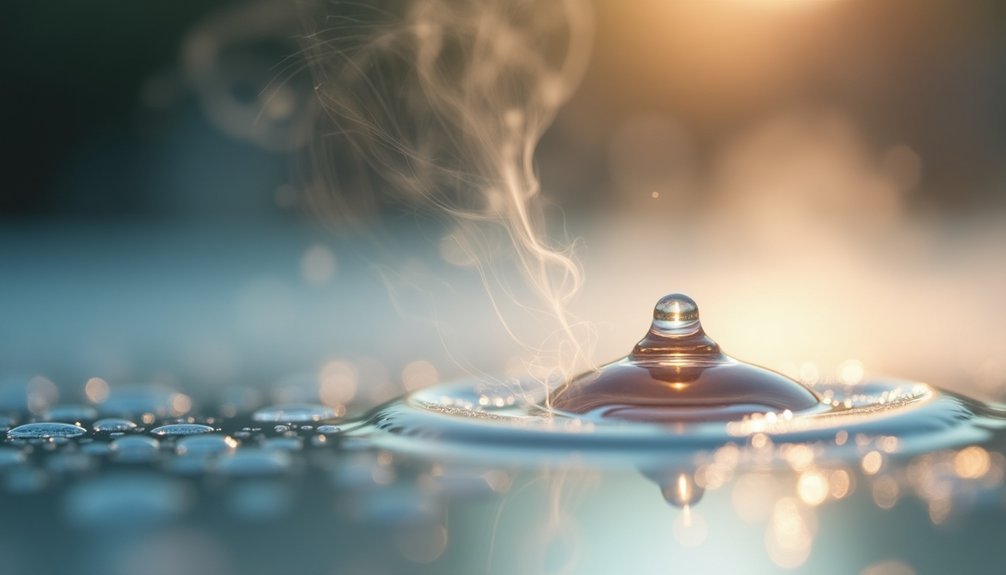When you apply fragrance to your skin, it triggers a complex dance between your body chemistry and the perfume's compounds. Your unique skin type, pH levels, and natural oils interact with the scent, while body heat activates different notes over time. The fragrance evolves through three main phases: top notes emerge immediately, heart notes develop within hours, and base notes surface later. Understanding your personal chemistry can help you choose and wear fragrances more effectively.
Understanding the Skin's Chemistry and Fragrance

While many people focus on a fragrance's scent in the bottle, your skin's unique chemistry ultimately determines how it will smell on you. Your blood type, diet, and pH levels create a distinctive environment that interacts with fragrance molecules in ways that can't be predicted just by smelling the perfume directly from its container.
When you apply a fragrance, it immediately begins to interact with your natural skin oils, causing certain notes to become more prominent while others may fade more quickly.
Your body temperature acts as a natural diffuser, gradually releasing the fragrance compounds throughout the day. Even your sweat composition and skin condition play crucial roles in how long the scent will last and how far it will project, which is why a perfume that works perfectly for your friend mightn't suit you as well.
The First 15 Minutes: Initial Scent Release
When you first spray a fragrance on your skin, the most volatile compounds known as top notes spring into action, creating your initial impression of the scent.
During this essential 5-15 minute window, you'll experience a burst of fresh, often citrusy or fruity aromas as the initial scent release unfolds.
The alcohol in your perfume helps these top notes evaporate quickly, while your skin's natural warmth activates the fragrance compounds.
Your unique skin chemistry plays a significant role in how the scent develops – factors like your body temperature and skin moisture levels will influence the intensity and character of these first moments.
As the volatile compounds dissipate, you'll notice the fragrance beginning to evolve, setting the stage for the heart notes that'll emerge next.
Hour One: Top Notes Evolution

Throughout the first hour after application, your fragrance's top notes dance through their most dramatic evolution. These initial scents, typically fresh and light, create your perfume's first impression before gradually changing into deeper heart notes around the 30-minute mark.
Your skin chemistry plays an essential role in how these top notes develop. Here's what you'll experience during this transformative hour:
- Fresh citrus, herbs, and light florals emerge immediately after skin application.
- Your body temperature influences the evaporation rate, with warmer skin intensifying the release.
- The scent starts shifting noticeably between 15-30 minutes.
- Your unique skin chemistry alters the fragrance, making it uniquely yours by either softening or intensifying certain notes.
This dynamic interaction between your skin and the fragrance creates a personalized scent journey that's distinctly your own.
Hours 2-4: Heart Notes Development
As the initial bright top notes bid farewell, your fragrance reveals its true personality during hours 2-4 through the emergence of heart notes.
These middle notes showcase floral, spicy, or fruity elements that define the fragrance's core character, creating a softer and more rounded scent experience.
Your unique skin chemistry plays an essential role in how these heart notes develop and persist.
You'll notice that the same fragrance might smell slightly different on you compared to others, as your skin's natural composition interacts with the scent molecules.
Environmental conditions also affect how these notes unfold – humidity and temperature can either intensify or subdue the fragrance during this phase.
The heart notes typically remain prominent for several hours, establishing the signature scent you'll carry throughout your day.
Hours 4-8: Base Notes Emergence

During hours 4-8, you'll notice the rich base notes of your fragrance taking center stage as musk, wood, and resin elements become more prominent.
Your skin's natural chemistry plays an essential role in this final phase, creating a unique scent signature that's distinctly yours.
The interplay between these deeper notes and your body's warmth produces an intimate olfactory experience that's both personal and long-lasting.
Deep Notes Take Hold
When your fragrance reaches the 4-8 hour mark, you'll notice a dramatic shift as the base notes emerge to create the scent's lasting signature.
As deep notes take hold, your fragrance transforms into its richest and most intimate expression, lingering longer on your skin through a complex interaction with your body's natural chemistry.
Your skin's unique characteristics will influence how these base notes develop:
- Your body heat activates and amplifies woody, amber, and musky undertones
- Natural oils in your skin help the fragrance unfold gradually
- Your hydration levels affect how the scent projects from your skin
- Environmental conditions impact the intensity and longevity of these deeper notes
The base notes can remain detectable for up to 24 hours, though their presence varies based on your individual skin chemistry and external factors.
Musk and Wood Unfold
Once your fragrance settles into its mature phase, musk and wood notes emerge to create a rich, intimate presence on your skin.
During hours 4-8, you'll notice these deeper base notes becoming more pronounced as the lighter top and middle notes fade away.
Your body chemistry plays an essential role in how these notes develop. Your skin's temperature, pH balance, and moisture levels interact with the musk notes, creating a uniquely personal scent signature.
Wood notes, particularly cedar and sandalwood, surface to provide an earthy foundation that perfectly balances any remaining sweetness from earlier phases.
You'll find these base notes particularly long-lasting, as they continue to evolve throughout the day.
The combination of musk and wood creates a sophisticated finale that leaves a memorable impression on those around you.
Skin Chemistry Final Phase
The final phase of your fragrance journey unfolds as base notes take center stage between hours 4-8. Your skin chemistry now plays the leading role in how these deeper, richer scents develop, creating a unique lasting impression that's distinctly yours.
During this phase, you'll notice:
- Heavier molecules like woods, resins, and musks becoming more prominent as lighter top notes fade away.
- Your skin's pH and natural oils transforming the scent into something personal and unique.
- Possible shifts to warmer, sweeter, or even slightly sour notes depending on your individual chemistry.
- Environmental conditions like humidity and temperature influencing how intensely these base notes emerge.
You're experiencing the fragrance's true character now, as these base notes continue to evolve and interact with your skin chemistry throughout the final hours.
Skin Temperature and Scent Projection
Your skin's warmth acts as a natural diffuser, activating fragrance molecules to create a more vibrant and noticeable scent projection.
You'll experience the strongest scent intensity in areas with higher body temperatures, such as your neck, wrists, and chest, where increased blood flow enhances the fragrance's presence.
The heat from your skin helps extend your perfume's longevity by slowing down the evaporation process, allowing the aromatic compounds to develop and unfold throughout the day.
Heat Activates Fragrance Molecules
When fragrance molecules meet your body's natural warmth, they spring to life in a fascinating chemical dance. As heat activates fragrance molecules, your skin temperature creates the perfect conditions for scent projection and longevity.
Your skin's warmth triggers four key reactions:
- Enhances molecule volatility, making the fragrance more detectable
- Creates a dynamic scent evolution as different notes are released throughout the day
- Combines with your natural skin oils to amplify the fragrance's projection
- Maintains a steady release rate that extends the scent's staying power
You'll notice this process most clearly when you apply perfume directly to your skin rather than clothing, as your body's heat orchestrates the perfect balance of fragrance release and preservation throughout the day.
Body Temperature Impact Zones
Since body temperature varies across different areas of your skin, strategic fragrance placement can dramatically enhance scent projection. When applying perfume directly to body temperature impact zones, you'll maximize your fragrance's performance throughout the day.
| Body Zone | Temperature Effect |
|---|---|
| Wrists | Blood vessels near surface amplify projection |
| Neck | Natural warmth extends fragrance life |
| Behind Ears | Consistent heat maintains scent strength |
| Inner Elbows | Pulse points boost molecular diffusion |
Your skin's changing temperature throughout the day affects how your perfume develops and projects. Warmer areas release top notes more quickly, while cooler zones allow the fragrance to unfold more gradually. Understanding these temperature variations helps you position your fragrance where it'll perform best, especially in different environmental conditions like high humidity or fluctuating ambient temperatures.
Warmth Extends Scent Life
Body heat serves as a natural amplifier for fragrances, transforming your skin into an ideal canvas for scent projection. When you apply perfume directly to your warm skin instead of spraying perfume on clothes, you'll experience a more dynamic and lasting fragrance evolution throughout the day.
Your skin's natural warmth enhances the fragrance in four key ways:
- Activates fragrance molecules gradually, creating a controlled release of scent
- Improves the projection of fragrance notes into your surrounding space
- Slows down the evaporation of volatile components, resulting in a richer scent profile
- Creates a unique scent signature based on your individual skin chemistry
This natural heat interaction makes your skin the perfect medium for fragrance application, offering superior longevity and a more complex scent development compared to fabric application.
Moisture Levels and Fragrance Longevity
The relationship between skin moisture and fragrance performance plays a significant role in how long your favorite scent will last. When your skin's moisture levels are high, fragrance molecules bind better and evaporate more slowly, creating a longer-lasting scent experience. You'll notice your perfume fading quickly on dry skin since there aren't enough natural oils to hold the scent.
| Skin Condition | Fragrance Duration | Recommended Action |
|---|---|---|
| Dry Skin | Short-lasting | Apply moisturizer first |
| Normal Skin | Moderate | Light moisturizing |
| Well-hydrated | Long-lasting | Direct fragrance application |
To maximize your fragrance's staying power, apply it right after moisturizing. High humidity environments can help maintain skin hydration, but you'll still benefit from using a hydrating lotion or oil as a base for your scent. This simple step creates an ideal foundation for fragrance molecules to adhere to your skin.
Personal Body Chemistry Variables
Whether you realize it or not, your unique body chemistry acts as a personal fragrance modifier, creating subtle variations in how perfumes develop on your skin.
Your body's natural composition influences how fragrances interact with your skin, making personal preference more complex than simply choosing a scent you enjoy.
The intricate dance between fragrance and skin chemistry transforms each scent into a uniquely personal olfactory signature.
Here's what affects your fragrance experience:
- Your skin type, pH levels, and natural oils create a unique foundation that alters how perfumes develop.
- Your diet choices impact skin chemistry, causing fragrances to project differently throughout the day.
- Your body temperature and hydration levels affect how quickly fragrance notes evaporate.
- Your hormonal fluctuations and hygiene practices, including soaps and lotions, can dramatically change how perfumes perform.
Understanding these variables helps explain why the same fragrance can smell different on various people.
Recording Your Fragrance Journey
Documenting your fragrance experiences through careful recordkeeping reveals deeper insights into how different scents interact with your unique body chemistry. When you track the fragrances applied, you'll discover patterns in how they evolve throughout the day and perform under different conditions.
| What to Record | Why It Matters |
|---|---|
| Duration | Tracks longevity on your skin |
| Environment | Shows performance in various temperatures |
| Note Changes | Reveals scent evolution over time |
| Skin Reactions | Identifies potential sensitivities |
Keep detailed notes about how each perfume develops, from the initial spray to its final fade. You'll learn which scents last longer on your skin and how environmental factors affect their performance. This systematic approach helps you understand your preferences better and makes future fragrance selections more informed and personalized to your needs.
Frequently Asked Questions
Does Perfume Get Absorbed Through Skin?
No, your perfume doesn't deeply absorb into your skin. It mostly sits on your epidermis and interacts with your skin's natural oils, where it gradually evaporates to release its fragrance.
What Does Fragrance Do in Skin Care?
In your skincare products, fragrance primarily enhances your sensory experience and satisfaction. It'll mask unpleasant base ingredients, create a luxurious feel, and may interact with your skin's natural chemistry for personalized scent experiences.
How Long Does Fragrance Last on Skin?
You'll typically experience fragrance lasting 3-8 hours on your skin. The duration depends on your skin type, moisture level, and the perfume's composition. Oil-based scents last longer than alcohol-based ones.
Does Fragrance Last Longer on Moisturized Skin?
Yes, your fragrance will last considerably longer on moisturized skin. When you apply perfume to well-hydrated skin, it creates a better base that helps lock in the scent and reduces evaporation by up to 50%.
In Summary
You'll discover that your fragrance's journey on your skin is deeply personal and dynamic. As your body chemistry interacts with the perfume, you're experiencing a unique scent story that unfolds over hours. From the initial burst of top notes to the lingering base notes, your skin temperature and moisture levels play vital roles. Track these changes to better understand how fragrances truly work with your chemistry.





Leave a Reply